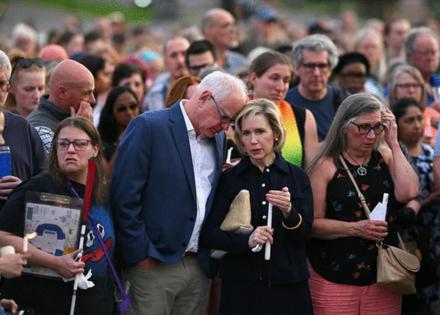Patricia Murphy: American lawmakers shot in their homes. How did we get here?
Published in Op Eds
The warning signs have been flashing red for years now: the foiled kidnapping of Michigan Gov. Gretchen Whitmer; the attempted assassination of President Donald Trump; U.S. Sen. Lisa Murkowski telling an Alaska audience recently, “We’re all afraid.”
When two Minnesota lawmakers and their spouses were shot in their homes over the weekend, the news was awful and shocking. But, sadly, it was not completely surprising.
How did we get here in America, with state lawmakers assassinated in the middle of the night and a country gradually getting used to news like that?
The Minnesota shootings are the latest acts of violence against American politicians, but they’re far from the only ones.
Pennsylvania Gov. Josh Shapiro and his family fled the burning governor’s mansion in April after two men threw Molotov cocktails through his windows in the middle of the night. The Washington Post later reported one of the alleged assailants told police that he planned to bludgeon Shapiro to death with a sledgehammer that night.
The attack on Shapiro followed the attempt on Trump’s life at his own rally in Butler, Pennsylvania, last year. And that came after the 2022 hammer attack on former House Speaker Nancy Pelosi’s husband, which followed a shooting at the Republican Congressional baseball team practice in 2018 and the attempted assassination of Democratic Rep. Gabby Giffords at her own town hall meeting in 2011.
It feels like a steady drumbeat when you read about it, but the U.S. Capitol Police report the number of threats against members, their families and staff have increased dramatically in recent years, with nearly 10,000 threat investigations last year alone, an increase of nearly 1,500 compared to the year before. The threats came no matter where the politician is from, what party they’re in or how long they’ve served.
Georgia lawmakers have faced dangers of their own lately, and death threats are not uncommon. At least four state senators — Clint Dixon, Kim Jackson, Kay Kilpatrick and John Albers — were all “swatted” at their homes over the Christmas holidays in 2023, with anonymous callers phoning police to say someone had been shot or stabbed or taken hostage at their homes.
The same thing happened to Lt. Gov. Burt Jones, while U.S. Rep. Marjorie Taylor Greene said she has been swatted more than a half dozen times. Not only do police respond in mass force to the calls, but it also means people who want to hurt or just scare those leaders also know where they and their families live.
Georgia lawmakers are trying to make it safer to serve by shielding their addresses on public campaign finance reports, and increasing penalties for anyone making false threats or emergency reports. Likewise, members of Congress are asking for stepped-up security and more funding for the Capitol Police.
There’s a much larger issue at play beyond the tactics of keeping lawmakers physically safe. A culture of political fighting in the country has given root to extremism and political violence. When Americans in different parties start to believe they aren’t just opponents but enemies, we’ve all crossed a line that’s difficult to uncross.
When I heard about the Minnesota shootings last week, I remembered sitting through a political briefing more than 20 years ago, when a consultant explained how effective the word “fight” could be in a campaign.
“People want to see some fight,” he counseled. Every speech, every ad, every communication should have some version of that idea in it.
But instead of “fight,” the candidate getting the advice chose the words “courage” and “lead” for that race. They seemed to fit better, and why focus on fighting if agreement and consensus were the goals in a democracy anyway? In retrospect, that seems awfully naive because he lost the race. The goal of democracy may be consensus, but the goal of campaigns is to win, often at any cost.
Maybe the consultant had a point. Or, more likely, maybe he was part of the problem to begin with. American politics had become a battle, which became a war. The real enemy, consultants and campaigns told us, was the guy on the other side of the ticket and the other side of the aisle. Unsurprisingly, regular Americans eventually began to think so, too.
So here we are, with a terrible stew of threats and violence, and elected officials facing a danger nobody deserves. But some of those same leaders are only fanning the flames, and it’s coming from the top.
When Trump was asked Tuesday if he had called Democratic Minnesota Gov. Tim Walz after the shootings, Trump shrugged a “no.”
“I think the governor of Minnesota is so whacked out. I’m not calling him … he’s a mess,” Trump told reporters aboard Air Force One. “I could call him, but why waste time?”
If showing leadership and taking one small step to repair American democracy count for anything, I can think of at least two reasons to waste the time.
But it’s not just up to the president. Elected leaders and even their campaign staffs have an obligation to make the political environment safer, too, by running campaigns that rise above violent rhetoric and resist demonizing their fellow Americans.
And voters can do their part by choosing candidates who can truly be leaders for these troubled times. Clearly, we’re going to need them.
_____
©2025 The Atlanta Journal-Constitution. Visit at ajc.com. Distributed by Tribune Content Agency, LLC.

























































Comments